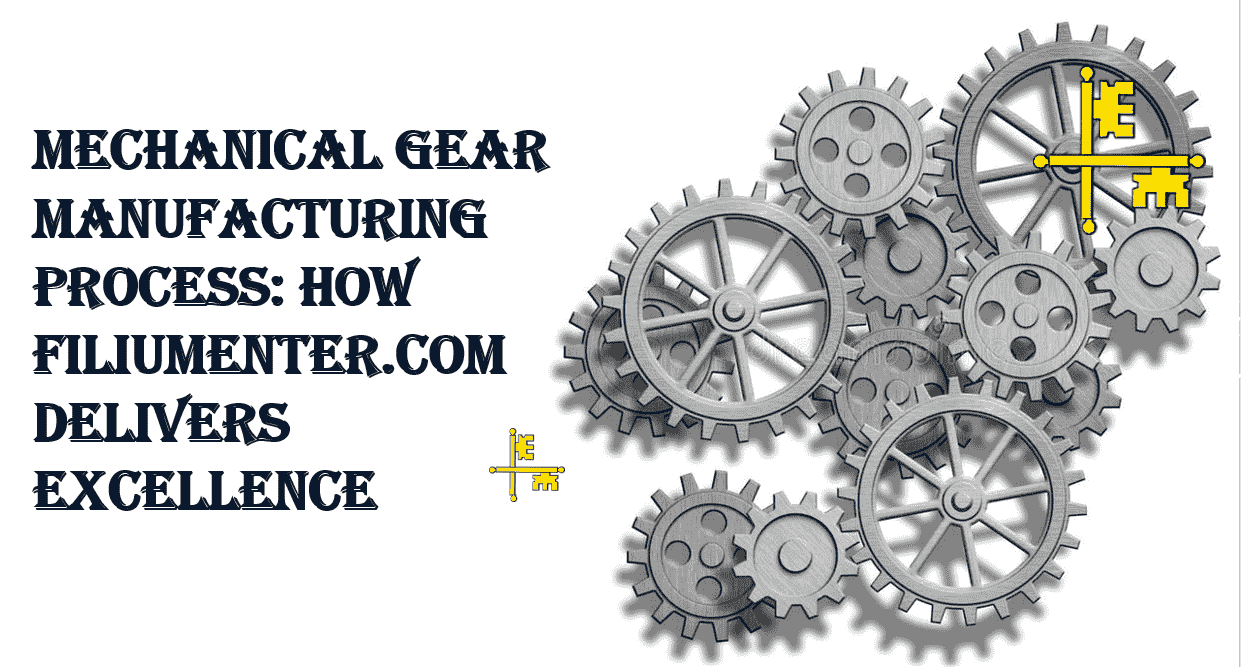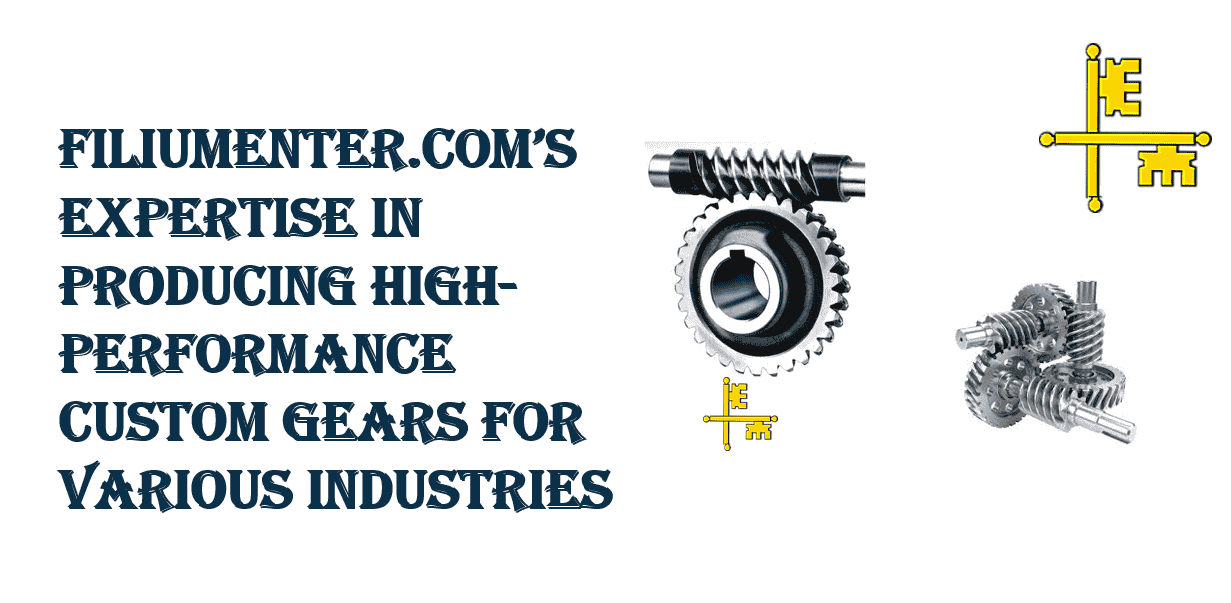Mechanical Gear Manufacturing Process- How Filiumenter Delivers Excellence

Mechanical Gear Manufacturing Process: How Filiumenter.com Delivers Excellence
Mechanical gears play an essential role in nearly every machine, from everyday vehicles to advanced industrial machinery. As integral components of mechanical systems, gears facilitate the transfer of motion and torque, making precision in their design and production crucial. The mechanical gear manufacturing process requires expertise, cutting-edge technology, and a focus on quality to produce reliable and high-performing gears. Filiumenter.com, a leading provider of custom gear manufacturing in India, stands out for its commitment to delivering exceptional gear production quality.
In this article, we will explore the mechanical gear manufacturing process at Filiumenter.com, highlighting the company’s advanced techniques, dedication to quality, and ability to deliver custom gear solutions tailored to specific needs.
Table of Contents
- Introduction
- Understanding the Mechanical Gear Manufacturing Process
- 1. Design and Prototyping
- 2. Material Selection
- 3. Gear Cutting and Machining
- 4. Heat Treatment
- 5. Finishing and Surface Treatment
- 6. Quality Control and Testing
- 7. Custom Gear Manufacturing at Filiumenter
- Conclusion: Excellence in Mechanical Gear Manufacturing
Understanding the Mechanical Gear Manufacturing Process
The mechanical gear manufacturing process involves several stages to ensure that gears meet precise specifications, perform under demanding conditions, and have a long lifespan. These processes include design, material selection, machining, heat treatment, finishing, and quality control. Here’s a step-by-step look at how Filiumenter.com delivers superior gear production quality through each stage.
1. Design and Prototyping
The first step in gear manufacturing is design. At Filiumenter, the gear design process begins with understanding the client’s requirements, including the purpose of the gear, the load it will bear, the speed at which it will operate, and any space limitations. Filiumenter’s engineers use advanced CAD (Computer-Aided Design) software to create detailed 3D models of the gear, optimizing the design for strength, efficiency, and functionality.
Once the design is complete, a prototype is often developed. This allows for a closer examination of the design’s feasibility and performance before proceeding to full-scale production. Prototyping is an essential part of Filiumenter’s custom gear manufacturing process in India, as it ensures that the final product will meet or exceed client expectations.
2. Material Selection
The choice of material is critical to the strength, durability, and performance of gears. Filiumenter ensures that only high-quality materials are used in the gear production process. Common materials for gears include carbon steel, alloy steel, stainless steel, and plastic, depending on the specific application.
Filiumenter’s experts are skilled in selecting the appropriate material based on factors such as load capacity, speed, environment (such as high heat or corrosive conditions), and cost-efficiency. This meticulous material selection process contributes to the overall excellence and longevity of the gears produced.
3. Gear Cutting and Machining
Once the material is selected, the next step is gear cutting, where the basic shape of the gear is created. Filiumenter uses advanced CNC (Computer Numerical Control) machines and gear-cutting tools like hobs, shapers, or gear shapers to precisely cut the gear teeth into the material.
Filiumenter’s gear manufacturing process ensures that each tooth is uniformly cut and matches the design specifications. CNC machines offer high precision, allowing for intricate designs and tight tolerances. This attention to detail is vital for gears that need to operate smoothly and efficiently under varying loads and speeds.
In addition to gear cutting, the machining process may include additional steps such as drilling, boring, and turning to further refine the gear’s dimensions and shape.
4. Heat Treatment
After the gears are cut, they undergo a heat treatment process to enhance their strength and wear resistance. Heat treatment can involve processes such as carburizing, nitriding, or induction hardening. This step hardens the teeth and other critical areas of the gear, ensuring they can withstand the stresses they will encounter during operation.
At Filiumenter, heat treatment is performed using state-of-the-art furnaces that allow precise control over temperature and timing, which results in consistent and reliable gear performance. This process ensures that each gear meets the necessary hardness and durability specifications for its intended application.
5. Finishing and Surface Treatment
After heat treatment, gears often undergo finishing processes to smooth out any rough surfaces and achieve the required surface finish. This can include polishing, grinding, and honing to reduce friction, minimize wear, and improve overall efficiency.
Filiumenter takes extra care in ensuring that the gears’ surfaces are smooth and free of defects, as rough surfaces can lead to premature wear and failure. Depending on the application, gears may also undergo additional surface treatments such as coating or plating to provide additional protection against corrosion and wear.
6. Quality Control and Testing
Quality control is a cornerstone of Filiumenter’s gear production process. The company employs rigorous testing methods to ensure that every gear meets exacting standards. This includes dimensional inspections, tooth profile checks, surface finish analysis, and hardness tests.
Filiumenter uses precision measuring instruments such as CMM (Coordinate Measuring Machines) and gear analyzers to check for accuracy. Each gear undergoes thorough testing to ensure it can handle the specified load and operate efficiently without failure. By adhering to strict quality control standards, Filiumenter guarantees that its gears will perform reliably in the most demanding applications.
7. Custom Gear Manufacturing at Filiumenter
One of the standout features of Filiumenter’s gear manufacturing process is its ability to offer custom gear solutions. As a leader in custom gear manufacturing in India, Filiumenter is equipped to create gears for a wide range of industries, including automotive, aerospace, industrial machinery, and robotics.
Filiumenter’s team works closely with clients to understand their unique requirements, including size, material, load capacity, and specific performance criteria. Whether you need high-precision gears, large industrial gears, or specialized gears for niche applications, Filiumenter delivers solutions tailored to your needs.
Conclusion: Excellence in Mechanical Gear Manufacturing
The mechanical gear manufacturing process at Filiumenter.com is a perfect blend of advanced technology, expert craftsmanship, and rigorous quality control. From design and prototyping to material selection, machining, and finishing, every stage of the process is executed with precision to ensure the highest quality standards.
For businesses in need of custom gear manufacturing in India, Filiumenter provides a reliable, efficient, and high-quality solution. The company’s commitment to excellence, attention to detail, and ability to deliver custom gear production ensures that clients receive gears that not only meet but exceed expectations.
When you choose Filiumenter for your gear manufacturing needs, you are partnering with a company that prioritizes innovation, precision, and durability—delivering gears that stand the test of time and provide unmatched performance.
Related Products
Here are some key statistics and facts that can complement the article on the mechanical gear manufacturing process:
Global Gear Industry Facts:
-
Market Size:
The global gear market size was valued at approximately $180 billion in 2023 and is expected to grow at a CAGR of around 6% from 2024 to 2030, driven by increased demand across automotive, industrial machinery, and renewable energy sectors. -
Automotive Sector:
In the automotive industry alone, gears are essential in systems like engines, transmissions, and drive trains. The global automotive gears market is projected to grow to $34 billion by 2026, expanding due to advancements in electric vehicles (EVs) and hybrid vehicles. -
Precision Manufacturing:
Gear accuracy is critical for performance. In the manufacturing of high-precision gears, tolerances can be as tight as ±0.001 mm, ensuring optimal function and efficiency. -
CNC Machining:
Modern gear manufacturing heavily utilizes CNC (Computer Numerical Control) machines, which offer up to 0.0002-inch precision, improving accuracy and reducing human error during production. -
Materials Used:
The choice of materials for gear production varies significantly. For instance, alloy steels (like 4140 and 4340) are used in high-stress applications, while stainless steel is favored for its resistance to corrosion in harsh environments. According to a 2022 industry report, carbon steel remains the most commonly used material for gears, making up about 50% of the market share in gear manufacturing. -
Heat Treatment Statistics:
A significant portion of gear manufacturing includes heat treatment to improve the hardness of gears. For example, carburizing increases surface hardness to 60-62 HRC (Rockwell Hardness), making the gears more durable and wear-resistant. -
Gear Production in India:
India’s gear manufacturing industry has been growing steadily, contributing significantly to the global supply. The country is one of the top producers of gears in Asia, with a focus on automotive, industrial machinery, and agriculture sectors. India accounts for about 10-12% of the global demand for industrial gears. -
Quality Control in Gear Manufacturing:
In the gear industry, quality control is paramount. Advanced tools like Coordinate Measuring Machines (CMM) are used for dimensional checks. The gear inspection market itself is expected to grow by 5.2% CAGR between 2023 and 2030, reflecting the increasing importance of precision in manufacturing.
Filiumenter’s Industry Position:
-
Custom Gear Manufacturing:
Filiumenter.com specializes in custom gear manufacturing. It offers tailored solutions for sectors including automotive, aerospace, robotics, and industrial machinery, ensuring high-quality, precision-driven products that meet unique operational requirements. -
Innovation in Gear Production:
Filiumenter employs cutting-edge CNC technology and CAD software in the gear design phase, ensuring that each gear is optimized for performance and durability. Their state-of-the-art manufacturing process allows them to meet the most stringent specifications for industries with complex gear requirements.






